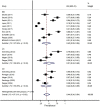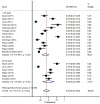The association between vitamin D status and inflammatory bowel disease among children and adolescents: A systematic review and meta-analysis
- PMID: 36698467
- PMCID: PMC9868587
- DOI: 10.3389/fnut.2022.1007725
The association between vitamin D status and inflammatory bowel disease among children and adolescents: A systematic review and meta-analysis
Abstract
Aim: Vitamin D deficiency is very common among children with IBD. Since there are conflicting results regarding the association of vitamin D with IBD, we conducted this systematic review to confirm the association of vitamin D with IBD.
Methods: We conducted a systematic search in Scopus, Cochrane Library, Web of Science, PubMed, and Google Scholar to find relevant studies. Articles with cross-sectional and case-control designs that reported the association between vitamin D and IBD among children were included.
Results: Eventually, 9 studies (with 16 effect sizes) reported the mean and SD or the median and the interquartile range of serum vitamin D levels in both subjects with IBD and control subjects. The random effects meta-analysis revealed that subjects with IBD had -1.159 ng/ml (95% CI: -2.783, 0.464) lower serum vitamin D concentrations compared with their healthy counterparts, but this difference was not significant. A total of 14 studies (with 18 effect sizes) with 2,602 participants provided information for the prevalence of vitamin D deficiency or insufficiency in patients with IBD as 44% (95% CI: 0.34-0.54) with significant heterogeneity noted among studies (p < 0.001; I2 = 97.31%).
Conclusion: This systematic and meta-analysis study revealed that vitamin D deficiency was associated with IBD. Longitudinal studies should be conducted in the future to confirm our findings. Large randomized controlled trials assessing the doses of supplementation of vitamin D would provide a better understanding of the association between vitamin D and IBD.
Keywords: children; inflammatory bowel disease (IBD); supplement; systematic review; vitamin D.
Copyright © 2023 Fatahi, Alyahyawi, Albadawi, Mardali, Dara, Sohouli, Prabahar, Rohani, Koushki, Sayyari, Hosseini and Abu-Zaid.
Conflict of interest statement
The authors declare that the research was conducted in the absence of any commercial or financial relationships that could be construed as a potential conflict of interest.
Figures




Similar articles
-
Association between vitamin D level and pediatric inflammatory bowel disease: A systematic review and meta-analysis.Front Pediatr. 2023 Apr 24;11:1155004. doi: 10.3389/fped.2023.1155004. eCollection 2023. Front Pediatr. 2023. PMID: 37168807 Free PMC article. Review.
-
Vitamin D therapy in children with inflammatory bowel disease: A systematic review.World J Clin Pediatr. 2019 Jan 22;8(1):1-14. doi: 10.5409/wjcp.v8.i1.1. eCollection 2019 Jan 22. World J Clin Pediatr. 2019. PMID: 30697514 Free PMC article.
-
Effects of Vitamin D Supplementation on Serum 25-Hydroxy Cholecalciferol in Inflammatory Bowel Diseases: A Meta-Analysis of Randomized Clinical Trials.Int J Prev Med. 2024 Nov 28;15:65. doi: 10.4103/ijpvm.ijpvm_133_23. eCollection 2024. Int J Prev Med. 2024. PMID: 39742127 Free PMC article. Review.
-
The serum level of vitamin D and prevalence of vitamin D deficiency among children with asthma in Asia and Africa: a systematic review and meta-analysis.Arch Public Health. 2024 Jul 5;82(1):103. doi: 10.1186/s13690-024-01321-5. Arch Public Health. 2024. PMID: 38970116 Free PMC article.
-
Relationship between abdominal obesity (based on waist circumference) and serum vitamin D levels: a systematic review and meta-analysis of epidemiologic studies.Nutr Rev. 2022 Apr 8;80(5):1105-1117. doi: 10.1093/nutrit/nuab070. Nutr Rev. 2022. PMID: 34537844
Cited by
-
Association between vitamin D level and pediatric inflammatory bowel disease: A systematic review and meta-analysis.Front Pediatr. 2023 Apr 24;11:1155004. doi: 10.3389/fped.2023.1155004. eCollection 2023. Front Pediatr. 2023. PMID: 37168807 Free PMC article. Review.
-
Association of selected adipokines with vitamin D deficiency in children with inflammatory bowel disease.BMC Pediatr. 2024 Jul 3;24(1):426. doi: 10.1186/s12887-024-04890-0. BMC Pediatr. 2024. PMID: 38961351 Free PMC article.
-
IGF1 Genetic Polymorphism and the Association between Vitamin D Status and BMI Percentiles in Children.Children (Basel). 2023 Sep 27;10(10):1610. doi: 10.3390/children10101610. Children (Basel). 2023. PMID: 37892272 Free PMC article.
-
Correlation of Socioeconomic and Environmental Factors With Incidence of Crohn Disease in Children and Adolescents: Systematic Review and Meta-Regression.JMIR Public Health Surveill. 2024 Mar 25;10:e48682. doi: 10.2196/48682. JMIR Public Health Surveill. 2024. PMID: 38526534 Free PMC article.
-
The Role of Vitamin D in Inflammatory Bowel Diseases: From Deficiency to Targeted Therapeutics and Precise Nutrition Strategies.Nutrients. 2025 Jun 29;17(13):2167. doi: 10.3390/nu17132167. Nutrients. 2025. PMID: 40647273 Free PMC article. Review.
References
Publication types
LinkOut - more resources
Full Text Sources

